A Look Inside CHOP’s New King of Prussia Hospital
The first comprehensive children’s hospital in Philly’s Pennsylvania suburbs is not only ready to deliver advanced care but also ready to handle its own future.
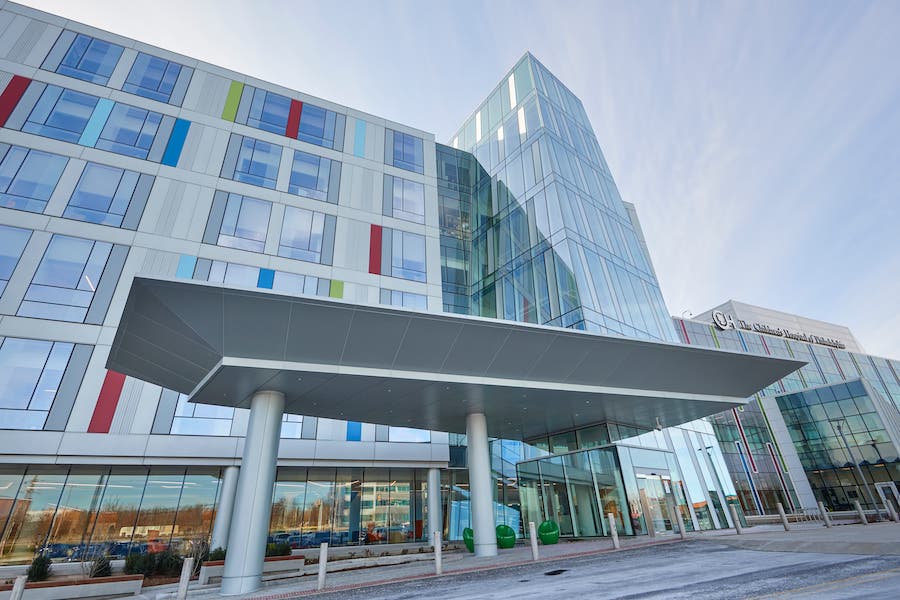
The “beacon” now marks the entrance to Children’s Hospital of Philadelphia’s new Middleman Family Pavilion (left) as well as the specialty care clinic next door (right). | Photos: Children’s Hospital of Philadelphia
Good news, parents in the northern and western suburbs of Philadelphia: If your child has a medical emergency, you won’t have to drive all the way in to University City in order to receive emergency care.
Same thing if your child needs surgery.
That’s because the new Middleman Family Pavilion at the Children’s Hospital of Philadelphia’s (CHOP) King of Prussia Campus is now ready for business.
The pavilion, which opened its doors last Wednesday, January 26th, is the first tertiary-care pediatric hospital in Philadelphia’s Pennsylvania suburbs. And its emergency room is the first round-the-clock pediatric emergency care facility in that area as well.
To make this addition to CHOP’s existing specialty and urgent-care clinic at the Village at Valley Forge possible, the 166-year-old pediatric hospital — the oldest in the nation — turned to a Middleman.
Specifically, Stanley C. Middleman and his family. A major gift from the founder and CEO of Freedom Mortgage, who also serves on the board of the CHOP Foundation, led the hospital to name its new satellite facility for the Middleman family.
So what did CHOP get by cutting in the Middlemen?
A bright, spacious and cheerful facility designed to make both patients and their families feel comfortable, with room to expand as it grows.
The cheeriness begins on the outside, where multicolored glass panels dot the facade of the Ballinger-designed building. Visitors now enter both the hospital and the specialty care clinic via a shimmering glass trapezoid the hospital calls “the beacon.”
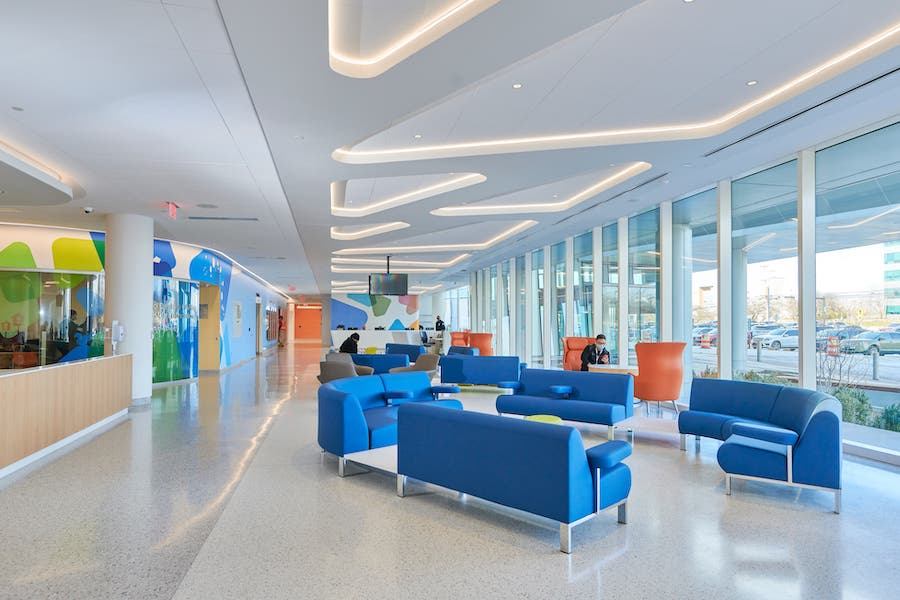
The main lobby of the hospital
Once inside, patrons are greeted by both the security staff and a member of the Family Visitor Services staff. The main lobby just beyond the greeters features a full-height wall of glass, bright tray lighting and colorful furniture, all elements that will be found throughout the hospital — even in the emergency department.
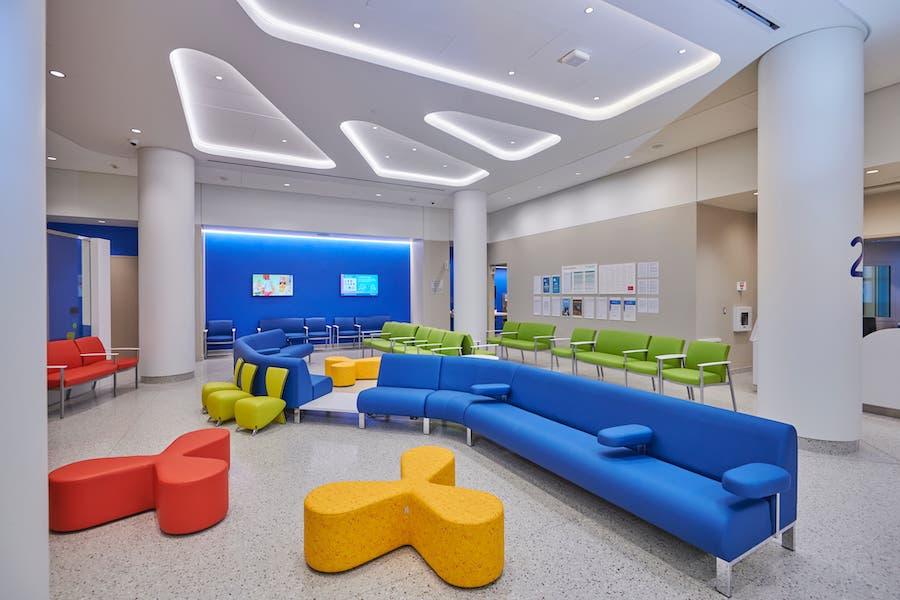
Emergency department waiting room
All of the patient rooms there are decorated with colorful photomurals, and some of them even have windows, which most emergency department patient rooms lack. “We wanted to capitalize on every bit of light available for our patients,” says Cheryl Gebeline-Myers, associate vice president of operations at the Middleman Family Pavilion.
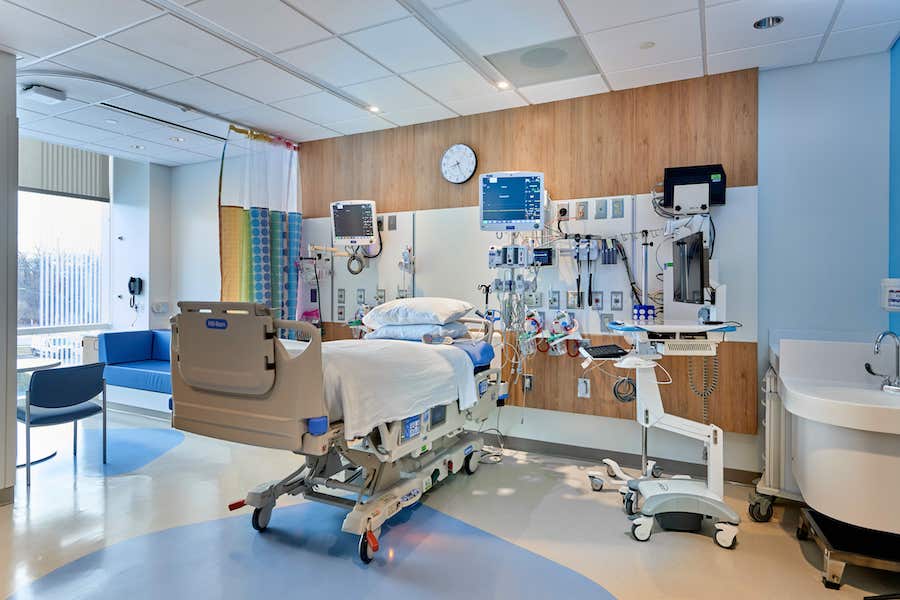
Inpatient floor room; caregiver space at left
And the same attention to comfort carries over into the rooms both on the inpatient floor and in the pediatric intensive care unit. Nowhere in this hospital do patients share rooms with other patients, and the regular inpatient rooms have alcoves where caregivers can relax next to their windows.
“It’s a way for them to disconnect from the clinical environment,” says Gebeline-Myers. “We also thought it was important for them to have their own TVs, so they’re not fighting over who’s watching what.” And while their parents and caregivers are watching what’s on their TV, the kid can not only watch regular TV channels but also download educational videos and stream content from their own devices onto the TV screen in their part of the room.
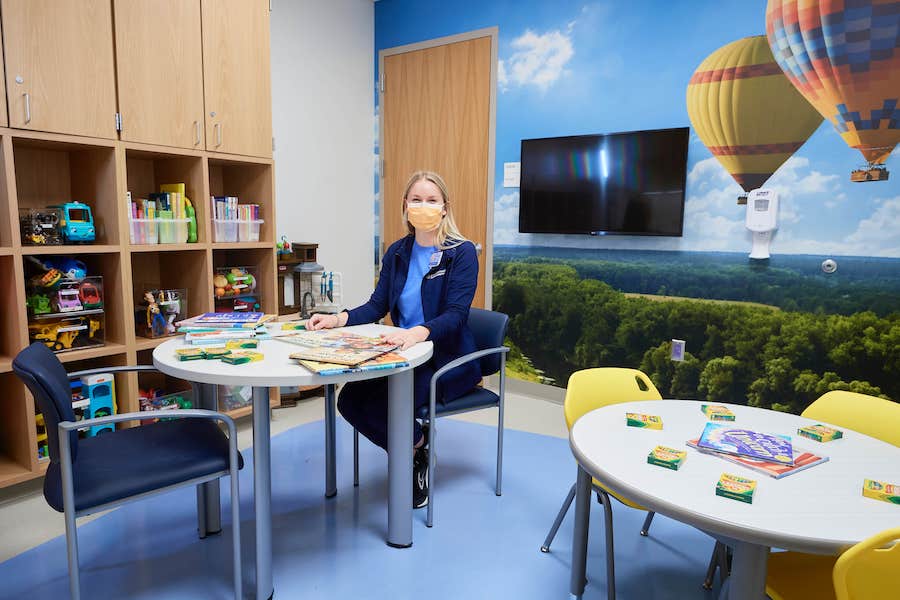
Child Life Specialist Jane Dudley in one of the playrooms
The hospital also has playrooms for patients, fully stocked with toys, games and other supplies for activities. One is located in the inpatient suite on the fourth floor and the other is in the pediatric intensive care unit on the second. “We really try to help kids be kids in the hospital,” says Jane Dudley, one of six child life specialists on staff in King of Prussia. The child life staff helps children understand why they’re in the hospital and what they will experience while there, and they also organize play activities for the patients. (“It’s a form of therapy,” says Gebeline-Myers.)
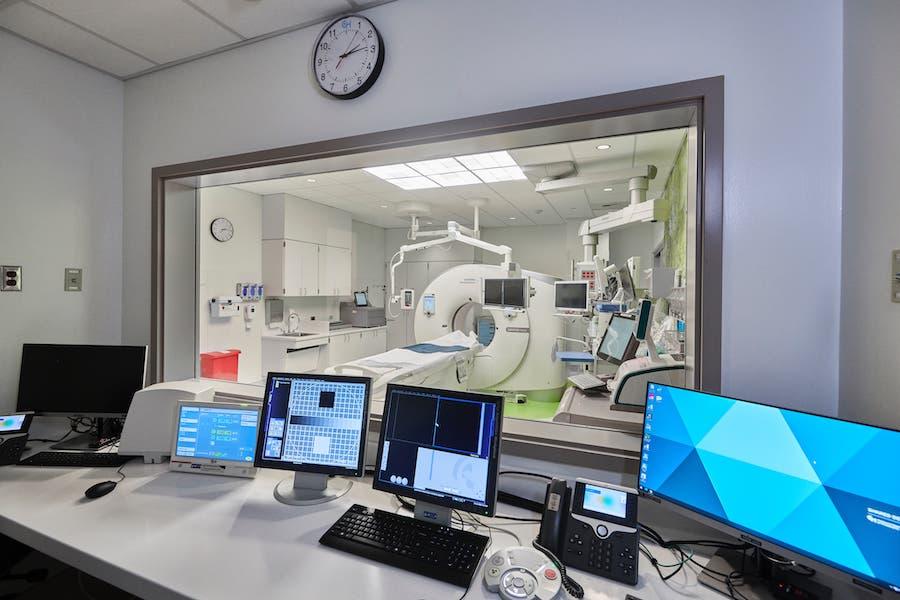
The CT scanner and the other radiology facilities are on the same floor as the emergency department.
And thanks to the Family Visitor Services staff, families get as much care as patients do at the Middleman Family Pavilion. The hospital has a prayer and meditation room, a cafeteria and a coffee shop, and Family Visitor Services staff will gladly fetch items from the latter two places and bring them to patient rooms.
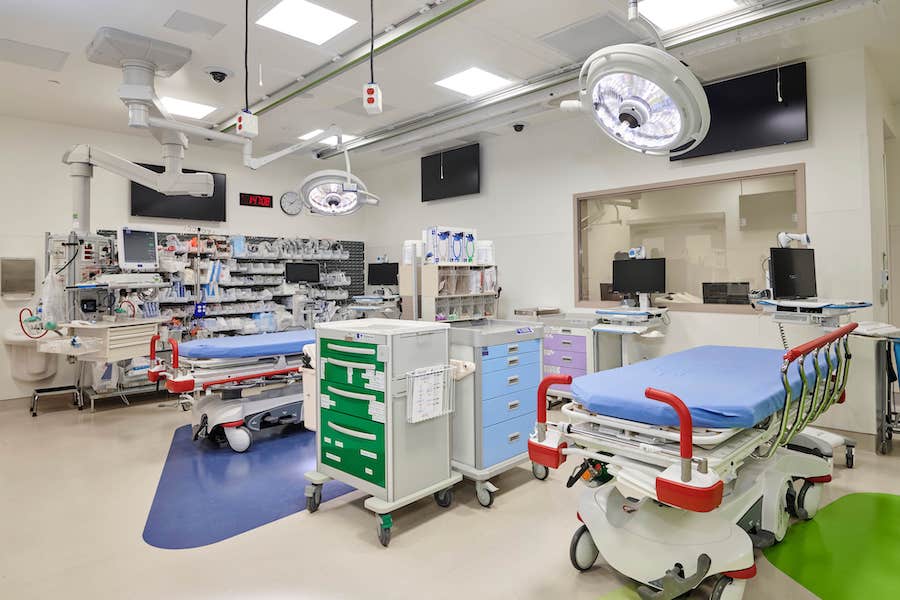
The “resuscitation room” lets emergency department staff treat children with serious issues quickly. Supplies are stored in a clean, staff-only corridor behind it.
The hospital is also designed to put critical services close to those who will need them most. The hospital’s radiology department is located next to the emergency department on the ground floor, where it can serve both emergency and urgent care patients without putting them in elevators.
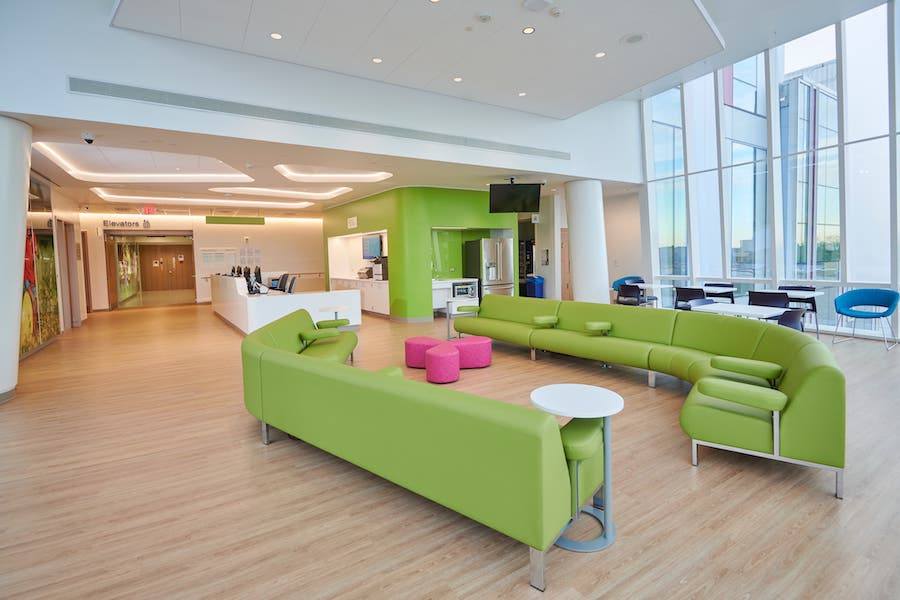
The surgical family waiting area on the third floor
And it was built to handle its future growth within its current building envelope. The emergency department has space to add more rooms to the 20 it already has, and the building’s fifth and sixth floors currently sit empty, awaiting their conversion to additional inpatient and surgical beds. Currently, the hospital has 36 medical-surgical beds and 16 beds in its pediatric intensive care unit.
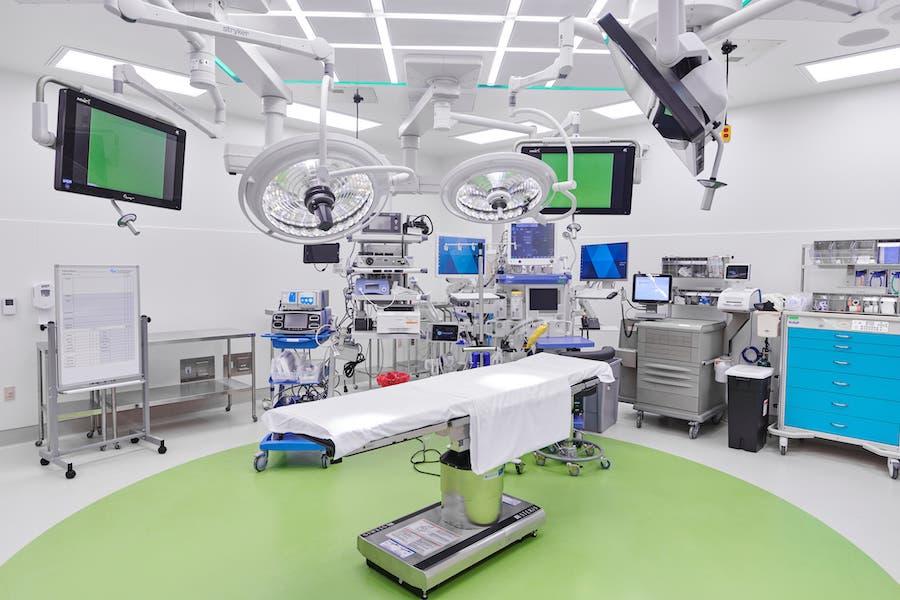
The operating room features a table with 360 degrees of motion and lights that disinfect it when not in use.
And if a child needs more advanced treatment than this hospital can offer, its staff coordinates closely with the mothership in University City and can transport patients there quickly via helicopter — the hospital has an arrangement with nearby Lockheed Martin that allows them to use the helipad at its facility.
The Middleman Family Pavilion and the specialty care clinic attached to it represent the continued evolution of CHOP’s relationship with King of Prussia. The hospital opened its first satellite specialty care center in KoP in 1995, in space it leased near the mall. Demand for services there grew to the point where CHOP decided to build a clinic to its specifications at the Village eight years ago. The Middleman Family Pavilion builds on that move.
“We’ve had a sort-of-devout community coming to this campus,” says Gebeline-Myers. “And it’s a booming community, with a lot of population growth and addition of new schools, indicating there’s a need for pediatric care closer to home.”
And now, the folks out here in the ’burbs have it.
Updated Feb. 1st, 1:53 p.m., to correct the spelling of Cheryl Gebeline-Myers’ last name. Updated July 19th, 2022, at 8:29 a.m. to correct the spelling of Ballinger Architects.


